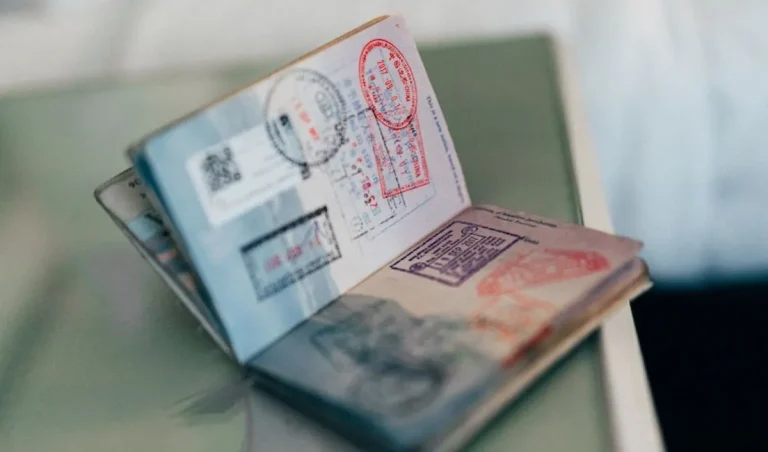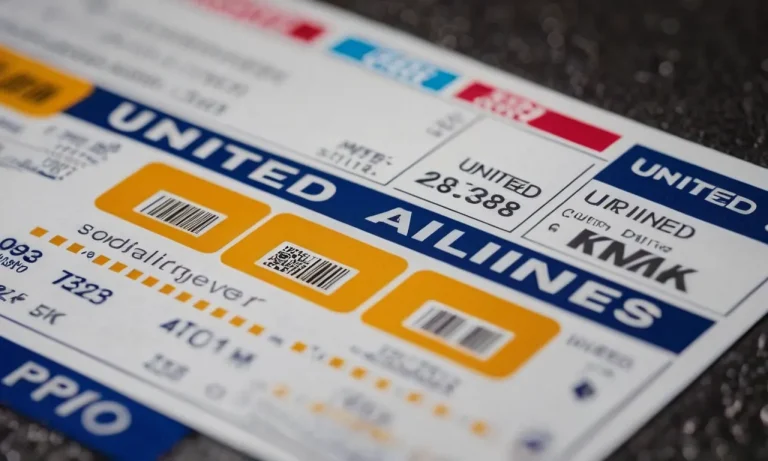Booking roundtrip flights can save travelers money compared to one-way fares. However, what happens if you ultimately don’t take the return flight?
Can airlines penalize you and how much could it cost?
If you’re short on time, here’s a quick answer to your question:
In this comprehensive guide, we’ll cover everything you need to know about the penalties for not taking a return flight. We’ll discuss airline policies, types of penalties, how to avoid fees, and steps for changing an unused return flight.
Airline Policies on Unused Return Flights
Roundtrip vs. one-way tickets
When booking a flight, travelers usually have the option to choose between roundtrip and one-way tickets.
A roundtrip ticket typically includes both the outbound and return flights, while a one-way ticket only covers the traveler’s journey to the destination.
It is important to note that the penalty for not using a return flight depends on the type of ticket purchased.
For roundtrip tickets, airlines often have specific policies in place regarding unused return flights.
These policies can vary between airlines, but most commonly, travelers who do not use their return flights may face penalties such as losing the value of the return portion of the ticket or having to pay a change fee to rebook or cancel the return flight.
Contract of carriage rules
Another aspect that determines the penalty for not using a return flight is the airline’s contract of carriage.
The contract of carriage is a legal agreement between the passenger and the airline that outlines the rights and responsibilities of both parties.
Travelers need to familiarize themselves with the specific terms and conditions of their ticket, as it will determine what penalties they may incur for not utilizing their return flight.
Some airlines may enforce strict policies that require passengers to use all segments of their purchased ticket, while others may allow for more flexibility. It is advisable to review the contract of carriage before purchasing a ticket to understand the potential penalties for not using a return flight.
Airline change/cancellation policies
Airline change and cancellation policies also play a role in determining the penalty for not using a return flight.
These policies can vary widely between airlines, so it is crucial to check the specific terms and conditions for each carrier.
To avoid any penalties, travelers should familiarize themselves with the change and cancellation policies of the airline they are flying with and consider contacting the airline directly if they anticipate not using their return flight.
Common Types of Penalties for Skipping Return Flights
When it comes to air travel, skipping a return flight can have consequences. Airlines have policies in place to deal with passengers who don’t use their return tickets. Here are some common types of penalties that travelers may face:
Fare difference fees
One common penalty for not using a return flight is the fare difference fee.
This fee is charged to passengers who skip their return flight and then decide to use the ticket for a later date.
Airlines typically require passengers to pay the fare difference between the original ticket and the current price for the new flight.
This fee can vary depending on the airline and the specific circumstances.
Fixed penalty charges
Another type of penalty for not using a return flight is a fixed penalty charge.
Airlines may impose a set fee that passengers must pay for not completing their journey as originally booked. This fee is often non-negotiable and can range from a few hundred dollars to several hundred dollars.
It is important to check the terms and conditions of your ticket to understand if there are any fixed penalty charges associated with skipping a return flight.
Forfeiture of unused flight
In some cases, passengers who skip their return flight may forfeit the value of the unused flight altogether.
This means that they will not receive any refund or credit for the unused portion of their ticket.
It’s essential to read the airline’s policy regarding unused flights to understand if this penalty applies.
If you think you may not use your return flight, it is worth considering other options, such as changing the ticket or canceling it before the departure date.
Higher fares on future bookings
Skipping a return flight can also result in higher fares on future bookings. Some airlines track passenger behavior and may penalize individuals who frequently skip return flights by increasing the prices of their future tickets.
This practice aims to discourage passengers from booking round-trip tickets and only using one leg of the journey.
If you frequently skip return flights, it may be worth considering alternative travel options or contacting the airline to discuss your specific situation.
It’s important to note that each airline has its own policies regarding penalties for not using a return flight. It is always recommended to review the terms and conditions of your ticket and contact the airline directly for specific information about penalties and fees.
Understanding the potential consequences can help you make informed decisions when it comes to your travel plans.
How to Avoid Return Flight Penalty Fees
For travelers who find themselves in a situation where they are unable to use their return flight, it is important to be aware of the potential penalty fees that may be incurred.
These fees can vary depending on the airline and the specific circumstances, but they can often be quite costly.
However, there are several strategies that travelers can employ to avoid or minimize these penalty fees.
Change flight dates ahead of time
One of the most effective ways to avoid return flight penalty fees is to proactively change the flight dates ahead of time.
Many airlines offer flexible ticket options that allow for changes to be made without incurring additional charges.
By planning ahead and making any necessary changes before the departure date, travelers can avoid the hassle and expense of penalty fees.
Cancel within 24 hours
Another option to consider is canceling the return flight within 24 hours of booking.
This can be particularly useful for travelers who realize shortly after booking that they will not be able to use their return flight.
Check airline policies before booking
Prior to booking a flight, it is essential to carefully review the airline’s policies regarding return flights. Some airlines may offer more lenient cancellation or change policies, while others may impose strict penalties.
By familiarizing oneself with these policies, travelers can make more informed decisions and avoid any unexpected fees.
Use flight credits strategically
If a traveler knows they will not be able to use their return flight, it may be possible to use the value of that ticket as a credit towards a future flight.
Many airlines offer this option, allowing travelers to rebook a different flight without incurring penalty fees.
However, it is important to note that there may be restrictions or limitations on the use of these flight credits, so it is advisable to check with the airline beforehand.

Changing an Unused Return Flight
When it comes to changing an unused return flight, there are several options available to travelers.
Whether you need to reschedule your return due to unexpected circumstances or simply want to extend your stay, airlines usually offer flexibility to accommodate such changes.
Options to change flight
When considering changing an unused return flight, it’s important to check the specific policies and terms of your airline. Some airlines may allow you to make changes to your return flight for a fee, while others may have more lenient policies.
It’s always recommended to contact your airline directly to inquire about their options for changing flights.
In some cases, you may have the option to change your return flight to a different date or time without incurring any additional fees.
However, it’s important to note that this option may only be available if there is availability on the desired flight.
Rebooking procedures
When rebooking an unused return flight, airlines typically require passengers to go through a rebooking procedure.
This may involve contacting the airline’s customer service department or visiting their website to make the necessary changes.
During the rebooking process, you may be asked to provide your original flight details, as well as the new date and time you wish to travel. It’s important to have this information readily available to ensure a smooth and efficient rebooking process.
Using flight credits
In some cases, if you are unable to use your return flight as planned, airlines may offer the option to use flight credits instead.
Flight credits can be used towards future travel with the same airline and are often valid for a certain period of time.
Using flight credits can be a great way to make the most of your unused return flight. It allows you to have flexibility in choosing a new travel date without incurring additional fees.
Extending return date
If you find yourself needing to extend your stay and change your return date, it’s important to check with your airline regarding their policies on extending return dates.
Some airlines may allow you to change your return date without any additional fees, while others may require you to pay a change fee.
Before making any changes to your return date, it’s recommended to check for availability on the desired flight. Popular travel periods may have limited availability, so it’s best to plan ahead and make the necessary changes as early as possible.
It’s always advisable to familiarize yourself with the specific policies of your airline regarding changing unused return flights. This will ensure that you are well-informed and can make the best decision based on your individual circumstances.
Steps to Take When You Need to Skip Your Return Flight
Life is unpredictable, and sometimes plans change unexpectedly. If you find yourself in a situation where you need to skip your return flight, there are several steps you can take to handle the situation smoothly and minimize any potential penalties.
Here are some important steps to consider:
1. Notify the airline in advance
It’s crucial to inform the airline about your change in plans as soon as possible. Most airlines have specific policies and procedures in place for passengers who need to modify or cancel their flights.
By notifying the airline in advance, you increase the chances of finding a suitable solution and potentially avoiding certain penalties. Make sure you reach out to the airline’s customer service department via phone or email and explain your situation.
2. Review the contract of carriage
Before making any decisions, it’s essential to review the contract of carriage that you agreed to when purchasing your ticket.
This document outlines the terms and conditions of your flight, including any penalties or fees associated with changes or cancellations.
Familiarize yourself with the airline’s policies regarding missed or unused return flights, as this will help you understand the potential consequences and any options available to you.
3. Check for exceptions
While airlines generally have strict policies regarding missed return flights, there may be exceptions in certain circumstances.
For example, some airlines may offer leniency if you have a valid medical emergency or if there are severe weather conditions.
It’s worth checking if there are any exceptions that apply to your situation. Visit the airline’s official website or contact their customer service for more information.
4. Accept change fees if required
In some cases, skipping your return flight may come with change fees or penalties. If this is the case, you will need to assess whether it is more cost-effective to pay the fees or to book a new one-way ticket.
Consider factors such as the cost difference, the availability of alternative flights, and any potential impact on future travel plans.
While change fees can be frustrating, sometimes accepting them is the most practical solution.
Remember, each airline may have its own specific policies and procedures, so it’s important to consult the airline directly for accurate and up-to-date information regarding penalties for not using a return flight.
By taking these steps and being proactive, you can navigate the situation smoothly and minimize any potential inconveniences or financial penalties.
Conclusion
Booking a roundtrip flight but skipping your return can lead to extra charges from airlines. While penalties vary, you may face fare differences, fixed fees, or forfeiture of the unused flight.
The best way to avoid surprises is to understand airline policies before booking and make any changes to your reservation well ahead of time.
With some strategic planning, you can feel confident booking roundtrip flights knowing you have options if you end up needing to skip the last leg of your journey.






